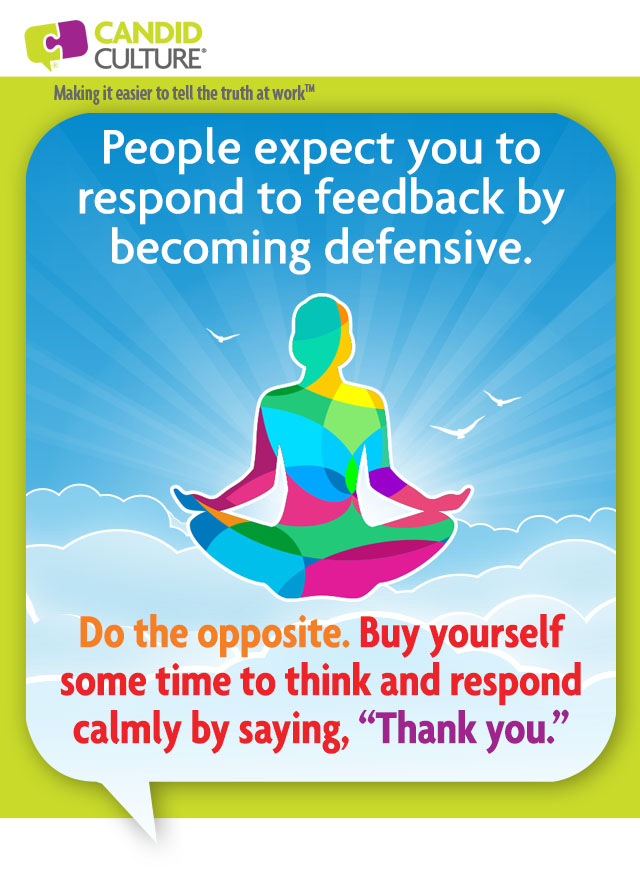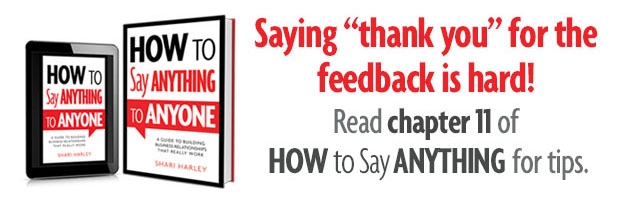Responding to Feedback – Do the Opposite of What People Expect
Most people avoid giving feedback because they’re concerned about (don’t want to deal with) the other person’s defensive response. It’s easier to say nothing than deal with someone’s defensiveness. So, we say things are fine when they’re not.
If you want people to tell you the truth, do the opposite of what they expect when responding to feedback. Rather than become defensive, say, “thank you.”

Saying “thank you for the feedback” is not intended to be a Pollyanna response, nor does it mean you agree and that the person is right. Saying “thank you” catches the other person off guard (in a good way) and buys you time to think and respond calmly, making it more likely that you’ll get feedback in the future.
Each of us wants to be thought well of and be seen as competent. Negative feedback calls both into question and the brain responds defensively. The challenge is that defensive responses scare other people into silence. And you only need to get defensive once for people to believe that you don’t deal well with feedback.
Don’t underestimate the power of your emotions and ego. You are likely to respond to feedback defensively, even if you don’t see yourself do it. A seemingly benign ‘explanation’ of why you did something as you did it, is seen as defensive and is thus off putting to others.
Here are six strategies for responding to feedback well:
- Have feedback conversations when you have the time to listen and are rested. If you’re tired, on a deadline, or rushing to your next meeting, the conversation will not go well.
- If someone catches you off guard with feedback and you know you won’t respond well, interrupt the person. Tell them that you appreciate them bringing this to your attention and you want to give the conversation the attention it deserves, but now isn’t a good time. Schedule a time to finish the conversation within a few days.
- Have a plan for how you’re going to respond to scheduled/planned feedback conversations before the conversations start. Tell yourself, “I will say thank you, end the conversation, and ask for another time to talk.”
- If you receive feedback that doesn’t feel accurate, ask others, who you trust, what they think. Just be prepared to hear what they have to say, and, of course, respond with “thank you.”
- Don’t respond to negative feedback in the moment, even if the other person wants you to and you think you can do so without being defensive. Don’t underestimate the power of your emotions. You will be upset, even if you don’t feel upset, and your response will be better after you’ve had time to process. Tell the person who gave you feedback that you take their feedback seriously and want to respond thoughtfully, and thus you’re going to think about what they said before responding. People may be frustrated with this response at first, but they’ll be appreciative later.
- Be sure to get back to the person, who has feedback for you, within a few days. Tell them you thought about what they said and then tell them how you feel. You can speak candidly. Your words will be calmer and more thoughtful than when you received the initial feedback.
We know people are hesitant to give feedback. Make giving you feedback easier by responding calmly. No one expects to hear “thank you for the feedback.” Your unemotional response will strengthen your reputation and relationships and make it more likely that you get more feedback in the future.
Tags: defensive reaction, giving feedback at work, how ro respond to negative feedback, how to say anything to anyone, responding to feedback, saying thank you to feedback








Your words will be calmer and more thoughtful then when you received the initial feedback.
The word ‘then’ in this sentence should be ‘than’
Thank you for taking the time to comment and tell me about that typo! I really appreciate it! And thank you for reading the blog, Nate!